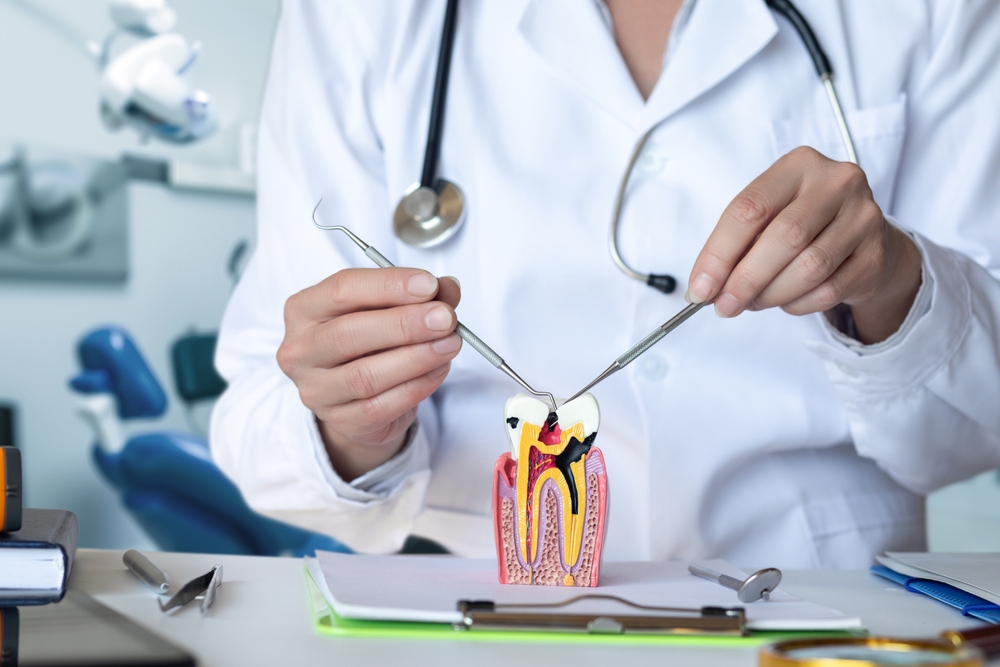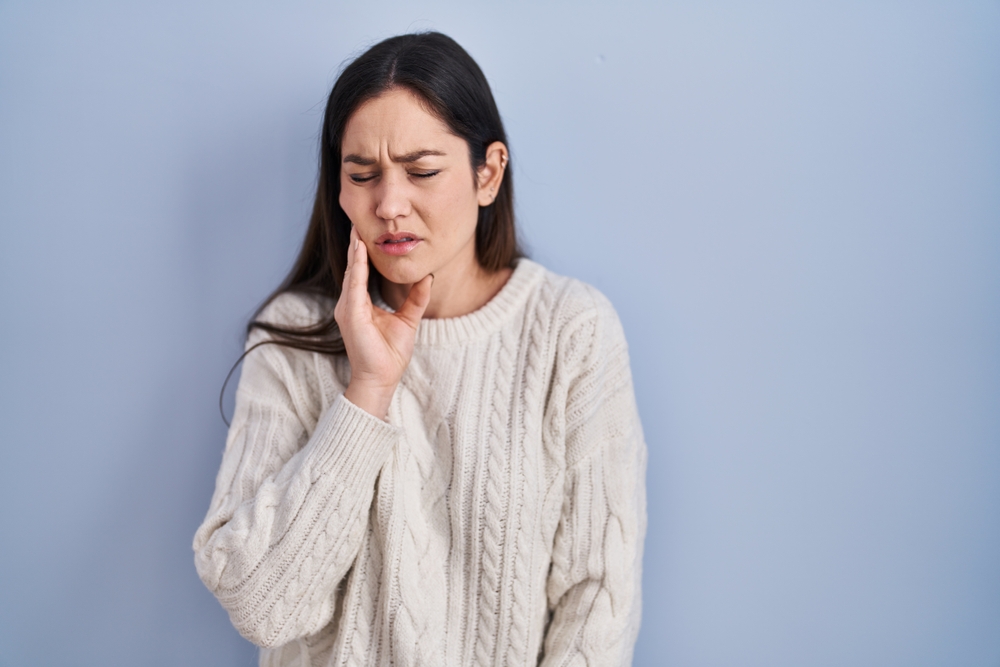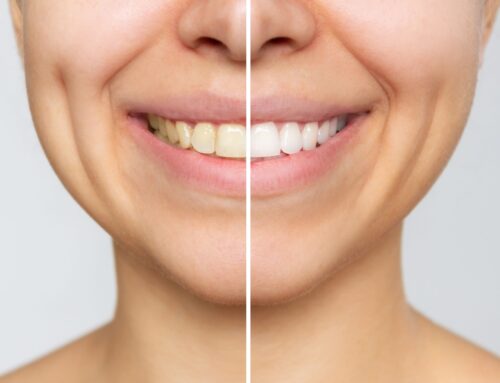The Root of Root Canal Pain
A root canal is a common oral procedure performed by an endodontist to save a natural tooth. Root canal surgery helps with tooth pain that you may be experiencing. Some of these causes may be due to tooth decay, tooth infection, or tooth trauma. It can also be caused by a slowly dying tooth from past trauma to the tooth. Each of these issues is treatable with a root canal.
During a root canal procedure the dentist makes a small opening in the crown of the tooth and cleans out the diseased pulp inside the pulp chamber of the tooth. After your tooth is cleaned and all decay is removed, your tooth will be sealed with a crown or filling.
Typically, a root canal procedure lasts anywhere from a half-hour to an hour and a half, depending on each case’s complexity. Most patients have no problem returning to normal activities the same day as the procedure.

Because a topical anesthetic is applied near the tooth and a local anesthetic is injected into your gums, you shouldn’t feel any pain during the procedure. Even with a perfectly performed root canal, there can be pain that is considered normal for three to five days after you’ve had root canal surgery.
Some common discomforts patients complain of having in the days following a root canal that are considered normal include:
- Sharp, intense pain or pressure for 3-5 days.
- Visible, but minimal, inflammation/swelling inside or outside your mouth.
- Sensitivity to cold and heat.
Following your root canal, you will be sent home with instructions on how to treat your tooth and take care of yourself. Following these instructions should minimize any normal pain after the root canal procedure.
Abnormal Root Canal Pain
It is much more likely that a root canal procedure will relieve pain than cause it, and it is normal to experience mild to moderate discomfort for a few days after a root canal. But any pain beyond this point may warrant a follow-up visit with your dentist.
If you find yourself having intense tooth pain after the three to five-day window, this is considered abnormal pain. There may be a few things that are causing lingering pain.
Most typically, intense pain that sticks around longer than a week after a root canal indicates that the infection is still there and the root canal wasn’t successful, and may warrant medication, additional cleaning of the canals, or other procedures.
While rare, an infection in the bone or an infected root canal are the most common reasons for ongoing post-root canal pain. These infections can happen days, weeks, or even years after the procedure.
Regardless of how long it’s been since your root canal, if it’s been more than a week and you’re experiencing any of the following symptoms, contact us to schedule an appointment.
- Ongoing pain that does not stop and gets worse when you bite down
- Tooth discoloration
- Gum tenderness or swelling
- Pus pockets (dental abscess)
- Persistent bad breath
- A bad taste in your mouth
- Face, neck, or lymph node swelling
In addition to infection, other things can cause abnormal pain following a root canal that might call for follow-up treatment—such as a missed canal, cement or air forced through the root tip, or an oversized crown or filling.
7 Reasons You Can Have Pain After A Root Canal
1. Post-Procedure Inflammation
Experiencing discomfort after a root canal is not unusual, and inflammation is often the culprit behind post-procedure tooth pain. This inflammation may stem from the procedure’s manipulation of the tooth or from the infection, causing swelling in the tooth ligament.
Fortunately, as time passes, this swelling tends to diminish, leading to a natural alleviation of pain in the days and weeks following the root canal.
2. Infection in the Bone

After all of the infection and decay are cleaned out of your tooth, there is still a risk that there might be some infection in your bone.
This is because our mouths are filled with good and bad bacteria, and there is a chance that there might be lingering bacteria around the root of the tooth. This bacteria could get down to the bone and become very painful and inflamed. While this type of infection can be painful, it is easily treatable.
When we remove all of the dead tooth and nerve, your immune system should be able to wipe out the infection. In some cases, your immune system might need some help, so you could get an antibiotic prescription that can treat your infection sooner.
3. Infected Root Canal
It’s possible for your tooth to become infected, even after a root canal. When this happens, it is usually because a filling leaks and allows bacteria from your saliva to get around the edges of the new filling. Once that bacteria enters the canal, it can create infection within a few days.
For this reason, most dentists will cap a tooth that needs a root canal with a crown and not just a filling. That said, we want to help you by saving your teeth, so a crown might not be the best solution at times. Each and every case is different, and at Snodgrass-King, we make sure to do what’s best for you.
Antibiotics aren’t typically the solution if you experience an infected root canal. You’ll likely need to have the bacteria removed, either by another root canal treatment or tooth extraction.
4. Missed Canal
Your teeth are filled with narrow openings that contain blood vessels and nerve fibers that provide nutrition and sensation to your teeth. These are called canals. Usually, each tooth has one to four canals.
When you get a root canal, it is going into a specific canal and getting out all of the old infection and decay, and then closing it up. Most dentists start with an X-ray to display where the infection has spread and to know where to treat it. But even with all of these measures, it is still possible that a canal might get overlooked and left untreated because some of these canals are harder to detect than others.
If a canal is missed, it can cause the nerve inside the tooth to become a pocket for bacteria to form an infection. If even a little bit of nerve remains, patients can continue to experience pain. Your tooth could also become sensitive to hot and cold as it was before the root canal.
In these cases, if the dentist determines there was a missed canal, then the root canal procedure has to be repeated. The second root canal procedure can be more invasive because the issue might be deeper than when it was first diagnosed.
Missing a canal is not an issue that will resolve on its own, so we want to make sure that you come and visit us so that we can help diagnose what the cause of your pain might be.
5. Cement or Air Forced Through the Root Tip
When filling a root canal, sometimes they can get overfilled with dental cement. This causes the material to come out of the root tip. Depending on what filling material was used and how much escapes will impact how much pain you may experience.
You could also be in more or less pain based on what kind of condition your tooth was in before the root canal. If the root tip itself was infected before the root canal, there’s probably room for a little excess cement, and you’ll never know it was overfilled. If the tooth was not infected around the tip of the root, that’s when overfilling is likely to cause pain after a root canal.
Another rare issue is when air gets forced through the root tip, which can cause pressure and pain. With these kinds of air bubbles, they can usually resolve themselves. While they take time to heal, the pain should subside on its own without any treatment.
6. Oversized Crown or Filling
After getting your crown or filling, you may find that it is still painful to bite down after three to five days. Your teeth may also be bothered and feel overcrowded. This is usually because the crown or filling is too large in your mouth.
If your filling is still hitting your surrounding teeth, you will just need to schedule a quick visit with your dentist. They will adjust your filling or crown to fit more comfortably in your mouth.
This is an easy, quick and painless fix. Then it usually takes another three to five days for any lingering pain to heal and for you to get used to the new feel of your tooth.
7. Phantom Pain
In rare cases, some patients may feel lingering discomfort, known as “phantom pain” after a root canal. This sensation occurs because the nerve leading to the tooth remains sensitive, even though the procedure has removed the diseased nerve. Over time, this discomfort usually subsides as the nerve adjusts. It’s important to talk to your dentist about any ongoing discomfort and consider relaxation techniques to help manage it during recovery.
How To Prevent A Failed Root Canal
If an experienced dentist performs your root canal procedure, a root canal will rarely cause any issues, require a second root canal, or need other treatment. In fact, a root canal procedure has a success rate of 86% to 98%.
Aside from only using an experienced and highly-trusted dentist to perform the procedure, the most important thing you can do to avoid a failed root canal is to follow your home care instructions. There are also things you can do following the procedure that will help prevent some of these potential issues.
When you get a root canal, we ask that you follow proper aftercare. Make sure to brush, floss, keep up with regular appointments, and don’t eat hard foods or other things that can cause your teeth to break. Following this aftercare will help your recovery and overall healing.
Pain Management
When dealing with pain beyond what’s expected after a root canal, it’s crucial to reach out to your dentist for guidance. While short-term medication might offer relief, there are additional methods for pain management you can explore, including:
- Maintaining good oral hygiene.
- Steering clear of hard or crunchy foods.
- Avoiding smoking.
- Avoiding cold beverages.
- Apply an ice pack to your cheeks for 10-15 mins.
- Elevate your head.
- Brushing with a soft-bristled toothbrush.
- Stress-relieving activities like meditation and yoga.
Symptoms to Watch: What’s Normal vs. What Needs Treatment
It’s common to experience some level of discomfort after a root canal, especially in the first few days following treatment. However, not all pain is created equal. Understanding the difference between normal post-procedure symptoms and signs that something may be wrong can help you know when to wait it out—and when to call your dentist.
Symptoms That Are Normal and Temporary:
- Mild to moderate tenderness when biting down or touching the treated tooth
- Slight inflammation in the gum around the tooth
- Dull aching or throbbing that improves each day after the procedure
- Sensitivity to pressure that typically resolves within a week or so
These symptoms usually stem from minor irritation to the surrounding nerves and tissues during the root canal process. Over-the-counter pain relievers and a soft diet are often enough to manage them.
Symptoms That May Signal a Problem and Need Treatment:
- Sharp, persistent, or worsening pain several days after the procedure
- Swelling that increases instead of subsides, especially if it extends to the face or jaw
- Pus or drainage from the treated area, which may indicate infection
- A feeling of heat or fever, suggesting a systemic infection
- Tooth discoloration or looseness in the affected tooth
These symptoms could point to complications such as an incomplete root canal, a cracked tooth, or reinfection. If you’re experiencing any of these warning signs, don’t wait—reach out to your dental provider promptly for evaluation and further treatment.
If You’re Having Abnormal Pain

The sooner you have one of our dentists check out any abnormal pain you might have, the sooner we can get you treated and back to feeling 100% again. We know that any of the above issues causing abnormal pain can be uncomfortable and concerning, but the good news is that they are all treatable.
A tooth that becomes re-infected after a root canal is not hopeless. The fix could be as simple as antibiotics. Worst case scenario, you might need another root canal procedure, extraction, or apicoectomy (a minor surgical procedure where the tip of the tooth’s root is removed.)
Root canals can cause a lot of stress, but if you have any issues following your root canal, please don’t hesitate to come in and see us. While these issues are painful, there are treatments that we can help you with. We have a team of specialists who can help meet your needs.
Root Canal FAQs
Is it Painful to Have a Root Canal Procedure?
Root canal procedures have come a long way on the pain scale with the introduction of local anesthesia. This type of anesthesia works to numb the tooth, making any root canal procedure less painful than it may sound. During a root canal procedure, patients may feel pressure while their tooth is being worked on. However, some mild pain or discomfort may occur after the procedure as the anesthesia wears off, which is normal and can be treated with Advil or Tylenol.
How Long Does a Root Canal Procedure Last?
For most patients, a root canal procedure typically lasts between 30 minutes and 90 minutes. However, this timeframe can vary based on:
- Number of teeth
- Level of infection
- Complexity of the procedure
Is the Nerve Removed During a Root Canal Procedure?
Yes, during a root canal procedure, the nerve (pulp) inside the tooth is removed, which is the soft tissue in the center of the tooth that contains nerves, blood vessels, and connective tissue.
Visit Us For Your Root Canal in Tennessee
If you still have pain 3-5 days after your root canal, you should call our office to see what we can do to help you. At Snodgrass-King, we know a lot about root canals and what kinds of issues may arise.
It is important to keep your mouth healthy so that you stay healthy. We want to help you achieve the best kind of dental care you can.
Snodgrass-King Dental Associates has 4 locations across Middle Tennessee (Mt. Juliet, Murfreesboro, Franklin, and Spring Hill). Contact us today to see if we can help jump-start and be a resource in your or your child’s healthy dental lifestyle.
We offer a variety of services for both children and adults. We can also address any orthodontic needs for children, teens, and adults.




